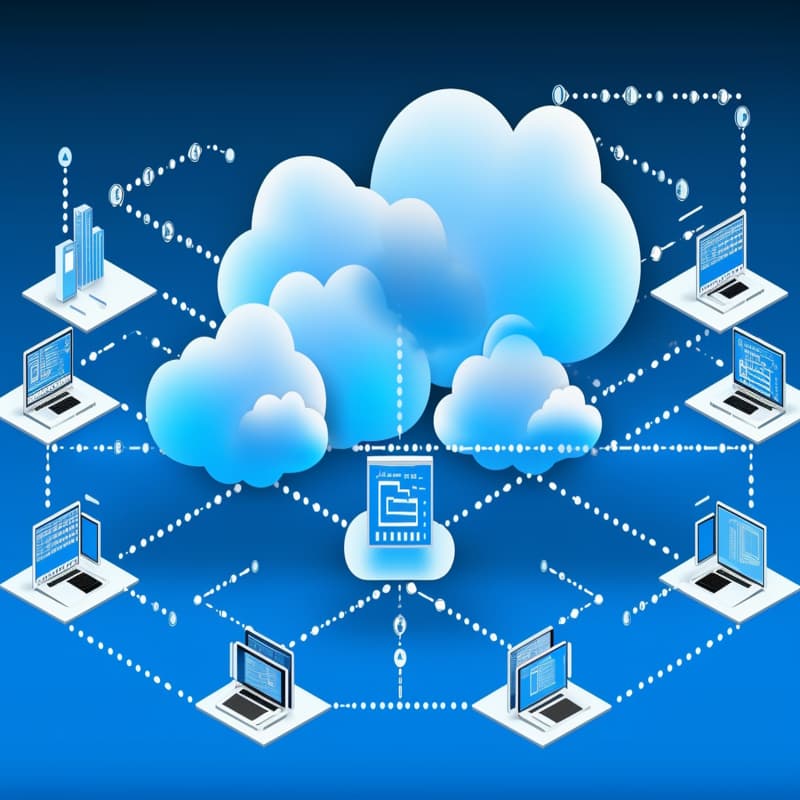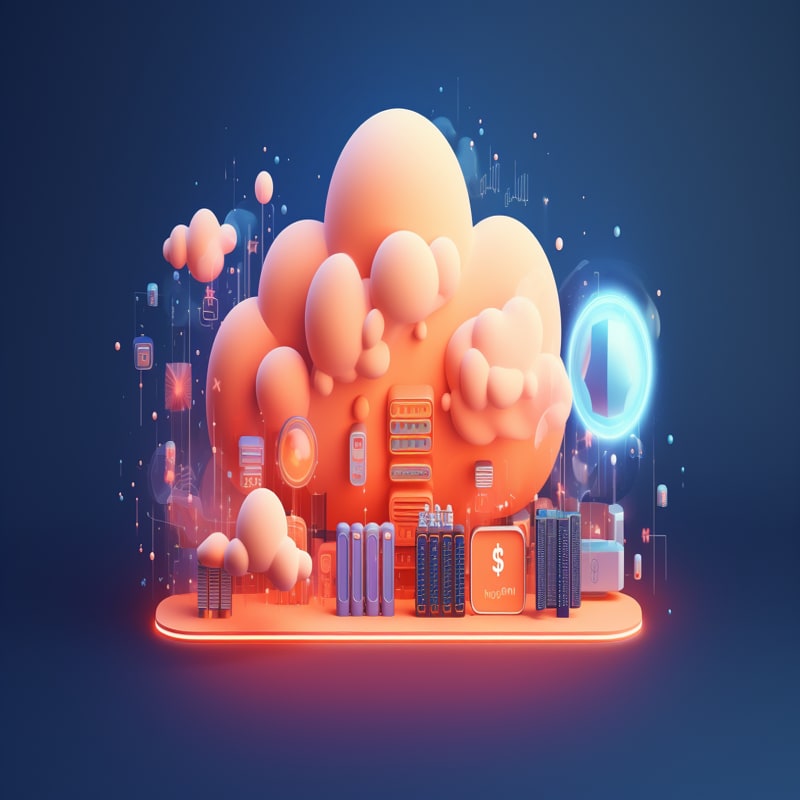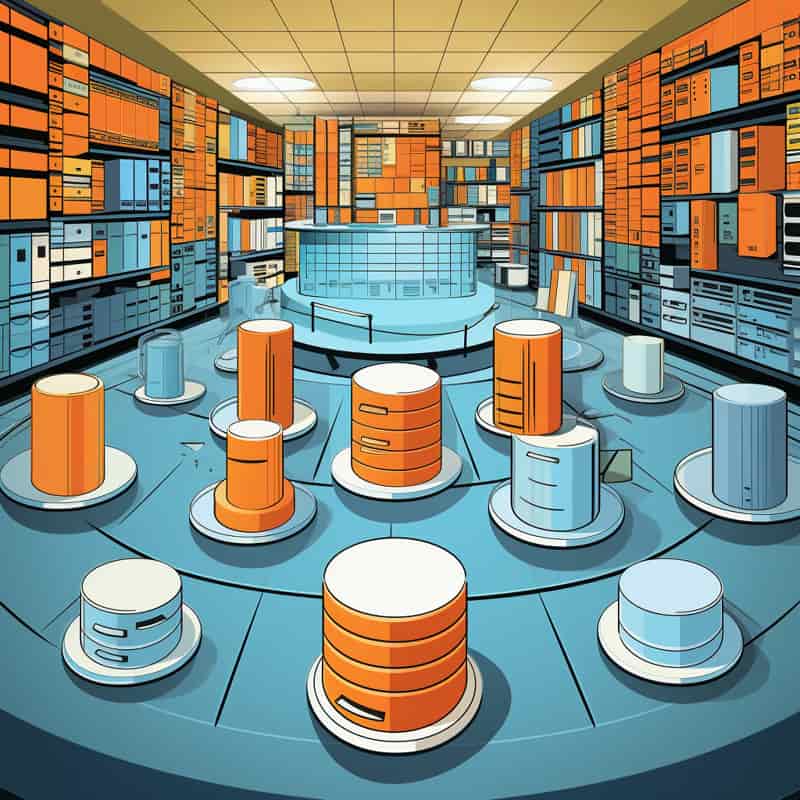Cloud Computing Interview Questions and Answers
Cloud computing has rapidly emerged as a cornerstone of today’s tech industry, providing computing services such as storage, processing power, networking and software over the internet.
Cloud computing question and answers helps you to prepare yourself for future interviews in this arena.

1.What is cloud computing?
Cloud computing is the use of remote servers on the internet to perform specific tasks, it is a cost-effective alternative to using personal computers or purchasing servers.
2. What is the objective of cloud computing?
Cloud computing is a platform that allows data to be stored, processed, and accessed from any location in the globe, with the only requirement being an active internet connection.
3. What are the three cloud application deployment types?
Cloud applications can be deployed in public, private, or hybrid clouds. Private clouds allow clients to own or request a server stack, while public clouds share servers.
Applications are more efficient and secure in hybrid deployment, which uses public and private cloud servers.
4. What is hybrid cloud architecture?
A hybrid cloud architecture is a cloud computing strategy that uses servers from both the public and private clouds.
It enables businesses to get the benefits of both public and private cloud deployment methods, including cost-effectiveness and security.
5. What is a hybrid deployment?
A hybrid deployment is a cloud computing model in which a company uses both public and private cloud servers.
It allows companies to use the benefits of both public and private cloud deployment models, such as cost-effectiveness and security.
6. What is a hybrid cloud arrangement?
A hybrid cloud arrangement is a cloud computing model in which a company uses a combination of public and private cloud servers to host different applications.
It allows companies to use the benefits of both public and private cloud deployment models, such as cost-effectiveness and security.
7. What is private cloud?
Private cloud refers to using a server that is not shared by anyone else.
8. What are the benefits of private cloud?
Private cloud offers a separate isolated server for users to work on, with applications sharing the same infrastructure as other clients.
9. What are the three service models available in cloud deployment?
The three service models available in cloud deployment are infrastructure as a service, platform as a service, and application as a service.
10. What is infrastructure as a service?
Infrastructure as a service provides access to the server’s operating system and allows users to install any desired applications on it.
11. What is platform as a service?
Platform as a service provides a dashboard where users can upload files, which are automatically put on the server by AWS.
12. What is software as a service?
Software as a service is a pay-as-you-go service where users pay a monthly subscription to use the software, regardless of the server it is on or the type of software installed on that server.
13. What is the distinction between IaaS, PaaS, and SaaS?
IaaS is infrastructure as a service, PaaS is platform as a service, and SaaS is software as a service.
14. What is the advantage of using cloud computing for hosting websites?
Cloud computing provides a cost-effective solution to hosting issues, eliminating the need for costly servers, troubleshooting, and maintenance.

Cloud Computing Training

Private cloud uses a private server, while public cloud uses internet-shared resources.
16. Why do AWS, Azure, and Google Cloud exist?
AWS, Azure, and Google Cloud offer infrastructure, software, and software as a service.
17. What are cloud services?
Cloud services are managed by various vendors and include application runtime middleware OS virtualization servers, networking, data, and applications.
These services allow users to build their own applications and use existing platforms.

18. What is a hybrid cloud?
A hybrid cloud combines both private and public clouds, allowing users to build applications privately and efficiently use them when traffic spikes.
19. What are some popular cloud providers?
Some popular cloud providers include Amazon Web Services, Microsoft Azure, and Google Cloud Platform.
20. How are AWS and Azure different?
AWS is large in compute capacity, flexible pricing, and other benefits, while Microsoft Azure is considered the second best in the market, behind AWS.
21. What characterizes Google Cloud Platform from AWS?
AWS is known for its large compute capacity, flexible pricing, and other benefits, while Google Cloud Platform is known for its infrastructure and ability to handle large amounts of data daily.
22. What are the compute services offered by AWS?
AWS offers various compute services, including EC2, Amazon QuickSit, RDS, and S3.
23. What are the storage services offered by AWS?
AWS offers storage services like S3 and Lambda.
24. Who are the various cloud service providers?
The Amazon Web Services (AWS), Google Cloud Platform (GCP), and Azure Microsoft Azure.
25. What is the secure interface provided by AWS?
AWS provides a secure interface with key pair values for connecting to servers, security groups, and creating security rules.
26. How does GCP provide a balance amount for users to use paid services?
GCP provides a balance amount for users to use paid services.
27. How does GCP charge for unused instances in AWS?
GCP charges on an early basis for unused instances in AWS.
28. What makes cloud computing better than on-premises?
Pay-as-you-go charging, flexibility, and data sharing are advantages of cloud computing versus on-premises solutions.
The tools and solutions it provides help teams and customers interact and exchange data while saving firms upfront and recurring expenditures.

Cloud Computing Online Training

IaaS provides fundamental computing infrastructure, PaaS provides a platform or runtime environment for developing, testing, and administering applications.
while SaaS is vendor-managed, end users manage everything else.
IaaS is more versatile and customizable, PaaS is more flexible and cost-effective, and SaaS more cost-effective.
30. What are some examples of cloud computing services?
Some examples of cloud computing services include Amazon Web Services (AWS), Microsoft Azure, IBM Cloud, VMware, Google Cloud Platform, and Digital Ocean.
Each service offers different capabilities and features, and users can choose the best service for their specific needs.
31. What makes up a cloud computing solution?
A cloud computing system includes hardware, storage, network, security, deployment automation and monitoring tools, and analytic services.
These parts ensure a secure and seamless cloud computing experience.
32. What are AWS EC2 and S3?
AWS S3 is a simple storage service, while EC2 provides secure and scalable cloud computation power.
Applications run on EC2, while data is stored on S3.
Both services form a secure and flexible cloud computing solution.

“Take the skies with our MCQs on cloud computing!”
1. What is cloud computing?
a. Physical server computing
b. Internet-based remote server computing
c. Local server computing
d. Computing with local and remote servers
2. What are cloud computing benefits?
a. It’s costlier than traditional computing
b. The processing speed is faster than traditional computing
c. IT is less secure than traditional computing
d. Scalability, adaptability, and cost-effectiveness
3. Which of the following is a popular example of Cloud Computing?
a. Microsoft Office 365
b. Amazon Web Services (AWS)
c. Google Drive
d. Apple iCloud
4. What is Infrastructure as a Service (IaaS)?
a. Cloud computing with virtualized resources
b. Virtualized storage cloud computing
c. Cloud computing using virtualized network resources
d. Virtualized operating system cloud computing
5. What is Platform as a Service (PaaS)?
a. cloud computing that provides virtualized computing resources
b. cloud computing that provides virtualized storage resources
c. cloud computing that provides virtualized network resources
d. cloud computing that provides a platform for developing and deploying applications
6. What is Software as a Service (SaaS)?
a. subset of cloud computing that makes use of shared resources to run virtual machines
b. A subset of cloud computing that makes use of storage resources that are virtualized
c. A subset of cloud computing that makes use of shared, virtualized computer networks
d. A subset of cloud computing that makes various software programs available online
7. Which of the following is a common example of Cloud Computing?
a. Storing files on a local hard drive
b. Using Google Drive to store files and collaborate with others
c. Using Microsoft Office to generate and modify documents
d. Using a virtual private network (VPN) to securely access remote servers.

Conclusion
Cloud computing interview questions and answers are essential to understand its benefits, regardless of experience level or expertise.
As cloud computing grows in popularity and adoption rates increase exponentially, answering frequently asked cloud computing queries will demonstrate your knowledge in this exciting dynamic sector.

Cloud Computing Course Price


Deepthi
Author